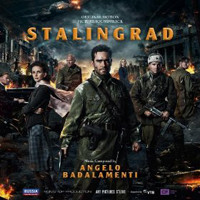- Composed by Angelo Badalamenti
- MovieScore Media / 2014 / 53m
The numbers are staggering: the battle of Stalingrad lasted for six months from August 1942, with the city under siege throughout, and some estimates place the number of casualties as high as two million. It is frequently cited as one of the turning points in the Second World War, with the Germans diverting large numbers of troops from the western front in their ultimately vain attempt to take the city. Unsurprisingly it has been the subject of much literature and many movies, the latest being this large-budget Russian-made 2013 film (directed by Fedor Bondarchuk and starring Thomas Kretschmann) which has become the country’s biggest-ever box office success.
76-year old composer Angelo Badalamenti made his name working on the films of David Lynch, whose success has been bolstered considerably by the composer’s highly creative, often dreamlike music. I imagine his career will always be defined by those scores but on many occasions he has written in a more conventional idiom, showcasing a more classically-minded orchestral side in numerous scores over the years. I don’t think it’s an exaggeration to suggest that Stalingrad is the most impressive music he has ever written in that vein, a late-career masterpiece that is surely destined to be considered amongst his finest contributions to cinema.
The deeply passionate music encompasses a huge raft of emotions and is resolutely melodic throughout, bolstered by a large number of outstanding themes representing the various times of hope and despair. The film has received some criticism for its unusually sympathetic attitude towards the German protagonist, portrayed as harbouring continual and large-scale doubts about his mission, but perhaps it is that aspect that allowed Badalamenti to take such an emotionally-involved approach to the score.
The album opens with the “Stalingrad Theme” in an arrangement featuring a heartfelt vocal from soprano Anna Netrebko; the elegiac strings accompanying her stunning performance are truly stirring. The noble sadness which floods through the piece is pitched absolutely perfectly, painting a portrait of torment and tragedy in the most incredibly moving way. This is followed by the “Stalingrad Overture” in which a very different kind of theme – initally full of heroism and mighty orchestral swells, before turning darker and more tragic – is introduced. The actual melody may be similar, but the feeling is certainly not.
“Desperate Search for Masha” introduces perhaps the most surprising aspect of the score – there’s no surprise that Badalamenti delivered the numerous heartfelt themes, but here he is paddling through mainstream action music waters, in the most elegant way. Bold and brassy, outlandishly up-front and strident, yet remaining resolutely melodic, it’s highly energetic and rewarding. “Kahn’s Theme” captures a complex range of feelings – undoubtedly militarism (especially when pared down to the trumpet solo for its middle section) – also a feeling of almost reluctantly dogged spirit. Then there is “Katya’s Theme”, the score’s warmest, aching with emotion in its extraordinary (and this time undoubtedly unsullied) portrayal of a mighty human spirit.
“Men of Fire” is another action theme, this one with an heroic sweat seeping from every pore; it may just be the most stirring piece of music on an album full of stirring pieces of music. Each time you think Badalamenti can’t push it any further, he pushes it further, creating one of the most striking portraits of heroism I’ve heard in a film score in a long time. Of course, some of the action music is considerably darker, and the lengthy “Execution and Attack” which follows is the primary example: choppy string phrases are joined by ominous blaring brassy bursts, then some of the “Men of Fire” material is reprised before the final seconds offer a brief but stunning return to the “Stalingrad Theme”, with vocal.
The album is only half over by this point but Badalamenti has built such a wealth of material, it is no surprise that much of the second half is built from the same ingredients. The quality doesn’t drop, not for a moment – “Russian Ambush” is a desperately anguished piece of action music; “Lovers Steal Away” yet another remarkably passionate and sweeping piece; and each of the main themes gets at least one well-developed reprise.
The album concludes with a lovely song, “Legenda”, performed by Zemfira, then one last performance of the “Stalingrad Theme”, this time just for strings. Stalingrad is a magnificent album, continually stirring and emotional. I haven’t seen the film but purely in terms of its impact on the album, it’s probably the finest film score I’ve heard from 2013, and the album release by MovieScore Media and Kronos Records is one that deserves to be heard by a large number of people. Angelo Badalamenti has never been better.
Rating: *****
facebook.com/moviewave | twitter.com/MovieWaveDotNet | amazon.com













I always thought that Badalamenti had a great, large-scale orchestral score in him, and it sounds like he has delivered!
One question: there are a lot of scores for weighty subjects that, while unassailable from a technical standpoint, are too dour and morose in their musical tragedy to listen to very often, for me (Schindler’s List being the archtypical example). Would you say that this is such a score?
It is 70 years since the Soviet army won the battle over Stalingrad.
We get Russian channels on tv and there are so many shows and documentaries about this time..
Thanks for the review
More like one of Morricone’s later-career war movie scores I’d say, Orion – Cefalonia, say, if you’re familiar with that.
This was just re-issued so I finally bought a copy. James, I agree that this is indeed an excellent score and your review was spot-on. Probably the only Badalementi CD I’ll ever own but one I’ll revisit often. Saw the film a few months ago and unfortunately thought it was dire.
Am I the only one who thought of Basil Poledouris’ LES MISERABLES when listening to this ?